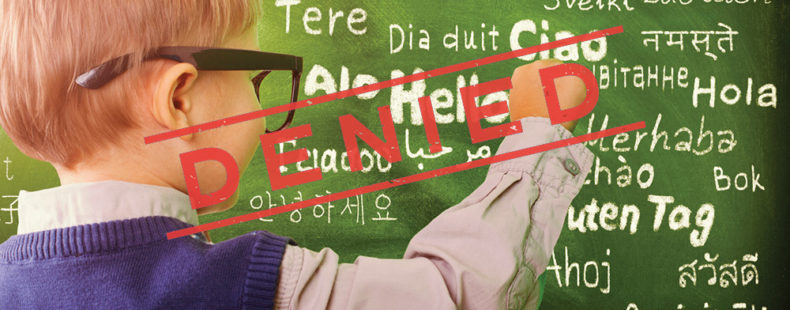What makes something a “real” language?
For most of us, real language is the language we speak and the languages that large groups of other people speak. You may not know how to speak French, for instance, but many other people do, and it’s an official language of many countries, so clearly it must be “real.”
But, what about different dialects of languages, regional languages, indigenous languages, and the native languages that people bring with them as they move around the world? Are these always considered “real”?
What constitutes “real” language often depends on who is listening and who gets to be heard—and all languages are not treated equally. For instance, there is no official language in the United States, yet some people still shame those who speak languages other than English or forms of English that they consider to be improper.
This problem was notably expounded on by Gerald Roche, an anthropologist and researcher at Australia’s La Trobe University, on Twitter in February 2019. It’s called language denialism, and it can be a formidable tool of oppression.
WATCH: What Is Accent Prestige Theory?
What does language denialism mean?
As Roche explained it, language denialism is simply “denying that some languages are languages.”
Found at least by the 1920s, denialism is the “practice of refusing to accept the existence, truth, or validity of something despite evidence or general support for it.” It’s based on denial, the noun form of deny, here meaning “to state that something declared is not true” or “to refuse to agree to something.” Recorded by the early 1300s, deny comes, via French, from the Latin dēnegāre, which has the sense of “to say no.”
Language denialism, then, occurs when people, especially groups in power, decide that certain languages don’t count or aren’t considered as valid.
In language denialism, Roche continued, mixed languages, dialects, jargon, lingo, and patois—“a regional language of a language”—are pitted against whatever is considered the “real” language. Such denialism is a problem because refusing to acknowledge someone’s language is refusing to acknowledge their voice and place at the table—not to mention their culture and identity.
Language denialism is always a form of linguistic supremacy—“My language is real, yours is fake/ incomplete/ a variety of my language, etc.” A few examples:
— more of a tafe than a uni (@GJosephRoche) February 21, 2019
What are some examples of language denialism?
In his Twitter thread, Roche cited examples of language denialism from all over the world.
🇦🇺 The 300+ Indigenous languages were known as jargon, lingo, etc. by invaders. Now, Kriol & Aboriginal English struggle for recognition as Indigenous languages because they’re not ‘traditional’.
— more of a tafe than a uni (@GJosephRoche) February 21, 2019
Roche noted India, where at least 364 languages are popularly recognized, only gives official status to 22 languages in its constitution. He also mentioned France, which only has one official language—French—primarily used in government and education, despite the fact that over 25 different regional languages are spoken throughout the country.
In the United States, which, again, has no official language, language denialism comes in many forms. Those who speak accented English or who are only partially fluent in English are often ostracized. In 2018, for instance, a Maryland Dunkin’ Donuts came under fire for a sign asking customers to call the manager and report any employees they heard “shouting in a language other than English”—for a free coffee and pastry. Even Marie Kondo was criticized for speaking Japanese and using a translator on her popular Netflix show Tidying Up With Marie Kondo.
I confess: I hate Marie Kondo because, aesthetically speaking, I’m on the side of clutter.
As for her language: It’s OK with me that she doesn’t speak English to her huge American audience but it does suggest that America is in decline as a superpower.— Barbara Ehrenreich (@B_Ehrenreich) February 4, 2019
Perhaps the most egregious form of language denialism in the US comes in the form of many white Americans’ refusal to acknowledge African American Vernacular English (AAVE) as a real form of English.
AAVE—also called African American English and Black English, or now more disparagingly, Ebonics—is a form of English just as complex as Standard American English (SAE), with its own rules, structures, and origin. Yet, people who speak AAVE are often profiled, discriminated against, and stigmatized as speaking “bad” or “poor” English in school, business, government, and culture.
Language denialism of AAVE upholds SAE as the “correct” form of English. The consequences aren’t just about dismissing AAVE’s grammar, pronunciation, or spelling. More perniciously, it suppresses and erases black culture. SAE is largely dictated by well-to-do, educated, white Americans, and policing the way people speak English is, in part, a method of maintaining the supremacy of white culture and customs.
WATCH: What Are Other Words Related To "Prejudice"?
How to combat language denialism
Ultimately, language denialism often goes hand in hand with ethnocentrism and racism, thereby resulting in systemic inequalities. As Roche explained on Twitter, denying language can mean denying people access to teaching materials, books, doctors, lawyers, radio and television, participation in the government, and even basic, everyday products—as people cannot access these goods and services in their language. “These discursive, material, institutional, and affective outcomes of language denialism produce reduced life chances & increased vulnerability of populations that speak non-languages,” he wrote.
U get profiled by 👮♀️ because of your accent. U get questioned & there are misunderstandings. U get locked up. No lawyers speak your language. No interpreters. U cannot understand everything the judge says. U go to prison.
— more of a tafe than a uni (@GJosephRoche) February 21, 2019
According to the United Nations Educational, Scientific and Cultural Organization (UNESCO), 40 percent of the world’s population “does not have access to education in a language they speak or understand.” To combat this, UNESCO observes International Mother Language Day every year on February 21 as a celebration of linguistic diversity and effort to raise awareness for the importance of multilingual education and societies.
It will take more than a day of awareness—and, of course, a Twitter thread, Roche would agree—to combat this global issue. The forces of language denialism are many and complex, and they are reinforced not only by individual prejudices, but also by governments and institutions around the world.
Ultimately, languages are more than just how we communicate: they are part of the bedrock of our cultures, histories, identities, and ways of thinking and being. No one should be denied access to education, opportunity, or basic human rights because of the language they speak.
As a dictionary, we wholeheartedly accept all languages as worthy and equal.














